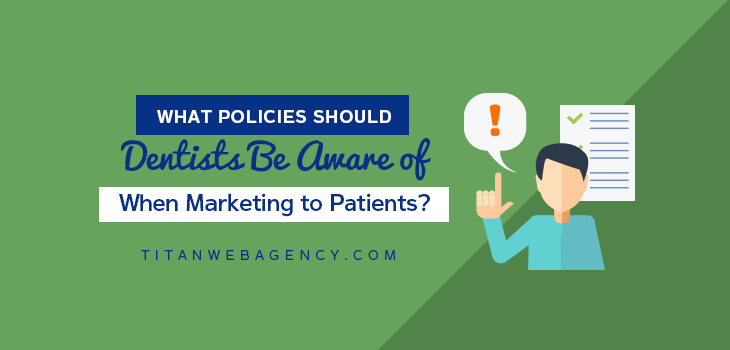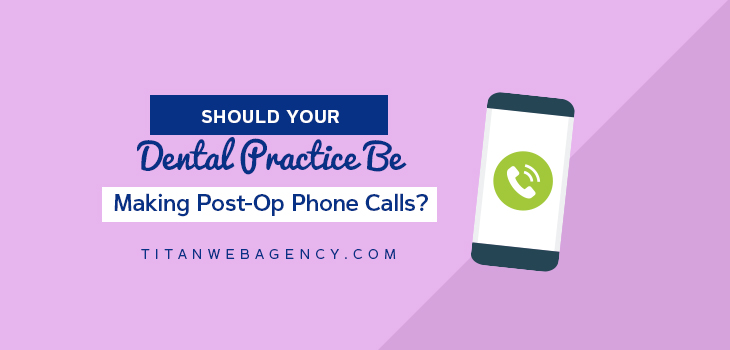What Policies Should Dentists Be Aware of When Marketing to Patients?

*Originally published March 2nd, 2016, Updated May 15, 2019.
Disclaimer: I am not a lawyer, and the information provided does not constitute legal advice. Consult with your attorney if you have any questions about the legality of your marketing strategies.
Let’s face it: if you want to attract more patients, you will need to do some marketing. But times have changed, haven’t they? Marketing is not like it used to be, especially for dentists who relied heavily on word-of-mouth referrals. Years ago, it was easier to obtain new patients. These days, however, it’s often difficult to even get noticed, let alone stand out among the many (sometimes dozens) practices in your market.
Before most people began using the Internet, marketing for dentists primarily involved placing ads in the Yellow Pages. It was a great way to attract new patients, but things have certainly changed since then. Patients have several ways to find a dentist and are more particular when making a choice.
Now, patients often attempt to self-diagnose the issues with their teeth and gums. If they end up needing a dentist, they’ll perform an online search or check with their insurance and choose a dentist who they feel fits their needs. Patients are a lot more savvy about their options these days. First, appearing in the Yellow Pages doesn’t mean anything.
As a result of these industry-wide changes, dentists have had to get their marketing online and adapt their digital healthcare marketing strategies not only to find, but also to acquire their ideal patients. Furthermore, web marketing for dentists has evolved alongside market trends and government regulations.
When it comes to marketing ideas for a dental office, there are some policies that you should be aware of.
Federal Trade Commission Act (FTC Act)
When creating and delivering dental promotions, it’s advisable to begin by reviewing the Federal Trade Commission Act (FTC Act).
As a general rule, you can’t claim or imply overall superiority over your competition when it comes to the quality of dental services offered. Because your audience won’t be able to properly verify these claims without having to visit every dental office in the area, it’s best to avoid this kind of claim altogether.
In addition, you should also follow the rules we’ve outlined below to avoid violating the FTC Act:
- Don't mislead or deceive (via partial disclosure of relative facts)
- Don't make false claims to create unjustified expectations
- Don't guarantee uncharacteristic results
- Don't distort facts
- Don't misrepresent charges
- Don't suggest unusual conditions
This goes hand-in-hand with the American Dental Association’s Code of Professional Conduct, Section 5F:
American Dental Association:
As a business professional, this makes sense. You don’t want your patients’ expectations to be misaligned with what you offer as a dental practice.
Remember to be careful with the words you choose. Before publishing anything to the market, it’s a good idea to have an outside party review your marketing materials to verify that all messages are clear before publication and that you are not in violation of any of the conduct codes set forth by government and industry agencies. Sometimes this can be hard to spot, which is why hiring experienced professionals is worth the value it can add.
Marketing Dental Practices and HIPAA Compliance
If you’re reading this, chances are you know that internet marketing for dentists can transform your practice. It’s no secret that the internet can help you build a robust practice that provides help to many patients.
Online marketing services such as search engine optimization (dental SEO), social media, and email marketing can attract a knowledgeable group of patients. There, patients will essentially make a decision based on their own research results, and if you can help ‘feed’ them information, then you will be seen as the expert. SEO helps to position your dental practice in front of the right audience, but it’s not an overnight success. It takes a lot of dedication on behalf of the dentist to make those efforts work long-term.
In other words, if you’re not using effective Internet marketing strategies, your potential patients will have a difficult time finding you. Even worse, they will probably find a competitor who is marketing effectively. With all of the ways the internet allows you to reach patients, it also provides your competitors the same access. Patients have a right to choose, and they might not always choose your practice.
Remember patient privacy above all else when it comes to HIPAA compliance. When developing your marketing strategy, create campaigns that don’t use patient data (regardless of whether they’re existing patients or potential patients). These are simple strategies you can follow to ensure you are not violating any codes of conduct and rules.
Overall, you want complete clarity on public and private data rules, especially regarding the prohibition on sharing patient data.
Internet Marketing for Dentists and Marketing Data
As a business owner, you can collect certain data types to make your campaigns more effective. However, this information is usually limited to the following:
-
Name
-
Phone Number
-
Email address
You can collect this information through social media, emails, surveys, online forms, or other approved means of collecting user data.
The most effective way to obtain this information from website visitors is by giving them something in return for sharing that data. For example, providing a downloadable document that teaches patients something is a simple way to encourage patients to share their email address. This could be a free PDF download on your top 5 ways to keep your teeth healthy. Patients who want this information will submit their email address to receive the document in their inbox. This is referred to as email marketing.
It may resemble the one below. (Compliments of Techila)

You don’t always have to give away a free download to get someone’s email address to start marketing to them through email. While you can’t (and shouldn’t) just spam email people without their consent, you can obtain emails through other methods.
For example, you might run a special offering of free Invisalign consultations. To book a consultation, you ask the patient to sign up and give you their email.
You can see how that can be effective in helping to grow your email list, as well as your marketing reach and potential patient list. All that’s happening is that you're asking those who have an interest in a service if they’d like to discuss it a little bit more with you. Most people will oblige.
Because the information that you collected from the online forms is marketing-oriented (and has nothing to do with any relationship with your dental practice), you’re allowed to use this data to contact them directly.
Private data can’t be used with internet marketing, but you must take the necessary steps to avoid breaking the rules. If you fail to do so and break HIPAA rules, you will face not only the loss of your license but also possible jail time. We’re not just talking about email lists here; we’re talking about violation of patient privacy.
The best way to avoid this issue is to manage your patient data separately. If you use customer relationship management software (CRM) to manage appointments, ensure that it isn’t linked to a database containing patient health data.
When Do Policy Issues Arise?
Policy violations and problems can come up when your digital marketing campaigns include Protected Health Information (PHI). Although most dental practices' marketing strategies will not involve private health information, we recommend that you thoroughly read the code to fully grasp what’s allowed. Educating yourself on the rules and regulations is the best way to stay ahead of the problems.
PHI essentially has two vital components:
1. Health-related data must be comprised of information related to the past, present, or future physical care the patient received and any payment that was received.
2. The data has to specifically refer to the dates associated with patient care, last name, address, email address, telephone number, social security number, medical record number, health plan, photographs, fingerprints, or voice prints.
Basically, for problems related to PHI compliance to occur, the data must include both of these components.
Where To Turn Now
If you’re feeling a bit apprehensive about moving forward with internet marketing after reading this, then don’t worry.
Before launching any marketing campaign, take the time to thoroughly investigate it and ensure that you’re not violating any government policies. Speak with an attorney.
Let’s take an in-depth look at PHI with the help of some examples to clarify solutions.
Policy Violation Example 1

You have a patient who is an NBA star from your local team, and you want to take advantage of this relationship.
You want to promote the fact that this athlete comes to your practice on your social media platforms. This seems like a logical way to promote the business and ride a little claim to fame, which makes sense, right?
It can add credibility to your practice, help you build your online presence, and attract new patients.
But you didn’t get permission from the basketball player to share this information or you failed to get signed consent.
In this scenario, if you shared this information without permission, it is a clear violation and improper use of your patient’s private health information.
Even if it’s exciting and flattering to have celebrity patients, you have to respect the fact that they are also protected by HIPAA, which your practice needs to adhere to.
If you think that you or your staff can’t maintain confidentiality, don’t accept a celebrity patient.
Policy Violation Example 2
Let’s say that you’re building an email list to send to your current patients. To create this list, you collect email addresses from two locations:
- Intake form (in the office)
- Your website
Both the form and website state that patients aren’t required to share any information as it’s for marketing purposes only. There’s no request on the site or the form asking for private information (and the email address is optional).
You also state that the information submitted will be used for marketing purposes, but private patient information won’t be included.
To send them the most relevant information, you sync their contact information with your dental practice management software.
Can you do this?
NO!
No information is obtained in the guise of marketing, and then they use their personally identifying private healthcare records.
Policy Violation Example 3
You want to start a dental hygiene newsletter to target new patients. Many of your current patients have already signed up for the newsletter on your website. Further, many regular patients also show interest in receiving the newsletter when you mention it during appointments.
You can compile email addresses from the website and those of patients who have expressed interest in the newsletter.
In this scenario, your newsletter campaign is only half HIPAA compliant. The email addresses that you collected from the website are compliant, while the list you created verbally violates HIPAA regulations.
Although the patient gave verbal consent, no written consent was obtained to add them to the newsletter list.
And since they are your existing patients, they have not been properly informed about how their information will be used.
Digital Engagement is Rewarding, But Requires Care
Considering all these rules and regulations, you may feel like throwing your hands up in the air and avoiding getting started with marketing your dental practice online.
But is that the right choice?
If you take the necessary precautions when collecting patient or potential patient data, you can confidently execute your marketing efforts while staying compliant without worry.
Don’t be afraid to start with social media because the rewards can be huge. The best approach is to develop strict guidelines for yourself and your staff to follow. At the end of the day, traditional marketing methods like the Yellow Pages are now almost irrelevant, and avoiding online engagement would mean missing out on opportunities to expand your practice.
Thousands of patients in your area are already active on social media, so even if you avoid it, you might already have a presence on Google, Yelp, and Facebook. It’s better to take ownership of your profiles and manage it regularly rather than lose out on the opportunities.
One way to take advantage of the social media opportunities for your dental practice is to create local listings on these websites and add your dental social media profiles to the listing. This approach also offers SEO benefits, as you gain a link to your social profile, and Google (as well as other search engines) will perceive your business as more relevant. And, of course, we know that claiming local directory listings such as this is beneficial and can help improve your local search results. Remember that internet marketing is an ongoing process.

What’s The Best Way To Share Pictures and Videos Online?

If you want to share pictures and videos of your practice online that feature patients, past or current, you must obtain written consent before taking any videos or pictures of patients. Provide them with a waiver to sign during new patient intake or when updating information about current patients, and inform them that, from time to time, you may like to showcase pictures on the website, social media platforms, or other intended uses. You can also take it a step further and verify consent during each visit.
When you take pictures of patients, have an idea of how you will use them ahead of time, so the patient understands your motive for wanting the pictures in the first place. During their visit, you can also ask patients to like your posts and share them on certain social media platforms. If you upload to your Facebook business page, for example, you can even ask patients to tag themselves in your pictures.
This can, in turn, drive more visitors to your page without the fear of violating any regulations.
It’s also good practice to be careful in allowing patients to take pictures at your practice. Patients may take pictures of their children or themselves during an appointment, but these images often include other patients in the background, which can cause issues.
It’s not likely, but possible. You want to minimize risk when it comes to these guidelines and ensure that everyone feels safe in your dental office.
When developing your own photography policy, consider including rules on patient rights and posting them in multiple locations throughout your office. Ensuring patients have access to this information and are reminded of your photography policies upon entering the premises will help prevent problems.
If you haven't done so yet, be sure to read our blog post on HIPAA compliance and social media.
Compliance in Marketing is Crucial, and Simple
Complying with these rules and regulations is simple but takes practice. A good rule of thumb is to always act in the best interest of your patient. Think about times in your life when you were not treated fairly in email lists or when someone had your contact information that you didn’t want them to have. If you’re unsure, ask. How has government regulation impacted your marketing efforts?
Share your thoughts and experiences in the comments section below. We’d love to know what you are doing to stay compliant in your dental practice marketing efforts.
Tyson Downs is the founder of Titan Web Agency, a company specializing in marketing for dental professionals. With an impressive track record of working with over 100 dental practices, Tyson has a deep understanding of the unique marketing needs within the dental industry.












.png)
.png)





